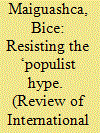|
|
|
Sort Order |
|
|
|
Items / Page
|
|
|
|
|
|
|
| Srl | Item |
| 1 |
ID:
149422


|
|
|
|
|
| Summary/Abstract |
Political ideology is often characterized along a liberal–conservative continuum in the United States and the left–right continuum in Europe. However, no study has examined what this characterization means to young Turkish voters or whether it predicts their approach to morality. In Study 1, we investigated in two separate samples the relation between young Turkish participants’ responses to the one-item left-to-right political orientation question and their self-reported political ideologies (conservative, socialist, etc.). In Study 2, we investigated the relation of moral dimensions as defined by Moral Foundations Theory to political party affiliation and political ideology. Results revealed that CHP, MHP, and AKP voters display a typical right-wing profile distinct from HDP voters. Findings regarding political ideology measures were consistent with party affiliations. Taken together, the findings reveal the distinctive nature of young Turkish people’s political orientations while supporting the predictive power of the one-item political orientation question.
|
|
|
|
|
|
|
|
|
|
|
|
|
|
|
|
| 2 |
ID:
168875


|
|
|
|
|
| Summary/Abstract |
The purpose of this article is to offer a feminist critique of populism, not as a distinct mode of politics, but as an analytical and political concept. As such, it seeks to redirect our attention away from populism, understood as a politics ‘out there’, towards the academic theoretical debates that have given this analytical term a new lease of life and propelled it beyond academic circles into the wider public discourse. In this context, the article develops two broad arguments. The first is that the two prevailing conceptions of populism are marred by anaemic conceptions of power, collective agency and subjectivity and, as such, are unable to present us with a convincing account of why this form of radical politics emerges in the first place, who its protagonists are, and how they come together in collective struggle. The second is that our current frenetic deployment of the term as a blanket descriptor for radical politics of all persuasions does not bode well for feminism politically. For both reasons, I conclude that feminists need to resist the current ‘populist hype’.
|
|
|
|
|
|
|
|
|
|
|
|
|
|
|
|
|
|
|
|
|